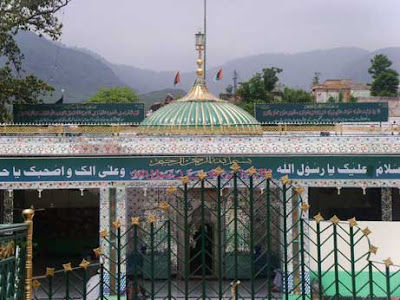Hazrat Syed Abdul Latif Shah Qadri Kazmi
Silsila: Qadria
Date of Urs: May 24
Address:
Noorpur Shahan Village, near Parliament Houses, Islamabad, Pakistan
Noorpur Shahan Village, near Parliament Houses, Islamabad, Pakistan
Aqtab Syed Abdul Latif Shah Qadri Kazmi known as Hazrat Bari Imam, Shah -e- wilayat of Federal Capital of Islamic Republic of Pakistan (Islamabad).
Hazrat Bari Imam was married but don't have any childern, people claimed to be his family are from the brother of Hazrat Bari Imam. This area was jungle when Hazrat Bari Imam stay here, area was famous due to robbers, when Hazrat came here he change the lives of this area and now this area is known as Noor Pur Shahan. Its been more than 300 years when Hazrat Bari Imam Came here.
All sufis of indo pak when came to Rawalpindi, Islamabad do come here, Urs of Hazrat Bari Imam Qadri held every year by April or May (as decided by Govt of Pakistan) for 5 years. People from all over Pakistan came here to attend Urs.
This place is on the back of the President House and Prime Minister Office. If you see any development here, that will be done by the people not by the Govt, Officials just have plan to build a new complex over here but could not make it happen.
Bari Imam (1617 to 1705), whose real name is Shah Abdul Latif Kazmi, was born in 1026 Hijra (1617 AD). His father, Syed Mehmood Shah, shifted his family from Jhelum District to Baghan village, presently called Aabpara. At that time, it was a barren land. Soon after the arrival of Bari Imam's family, his father started farming and also kept some animals. Shah Latif helped his father in grazing the animals, but left his father at 12 and came to Nurpur Shahan. From Nurpur Shahan, Bari Imam went to Ghaur Ghashti (now known as Attock) where he stayed for two years for learning fiqh, hadith, logic, mathematics, medicine and other disciplines, because at that time Ghaur Ghashti was great seat of learning.
The Saint Bari Imam used to live in a cave, where he was visited by wild animals and djinns. A rock in the cave which resembles a cave is said to be a real snake turned into stone by the Holy man. There is a fire burning in the cave for some 300 years now, and a tree in front of the cave is said to bee also 300 years old. According to legend Bari Imam lived a hermits life in this cave for twelve years.
He was the first spiritual guide of Gohar Shahi as well. As Gohar Shahi states in his book about Bari Imam that at the age of 34 Bari Imam appeared before me (Gohar Shahi) and said: "My son your time has come, your must go to the shrine of Sakhi Sultan Bahoo Sahib to receive the Sacred Inner Dimensions of Spiritual Knowledge."
To get spiritual knowledge and satiate his love for Islam, Bari Imam visited many places, including Kashmir, Badakhshan, Bukhara, Mashhad, Baghdad and Damascus. He not only received spiritual knowledge in these places but also held discussions with scholars belonging to different schools of thought on various subjects. Later, he went to Saudi Arabia to perform Hajj.
Bari Imam received spiritual knowledge from Hayat- al-Mir (Zinda Pir). His 'Pir' gave him the title of Bari Imam, which proves his link to Syed family. Bari Imam converted thousands of Hindus into Muslims through the teachings of Islam at Nurpur Shahan. It is stated that once Mughal Emperor Aurangzeb Alamgir himself came there to pay respects to Bari Imam.
Mughal Emperor Aurangzeb, who was devoted to spreading his empire, originally built the silver-mirrored shrine of Hazrat Bari Imam [RA]. It has been renovated and is now is maintained by the government. Inside the mausoleum, where the great saint rests, only men are permitted, a steady stream of worshippers enter and exit, most bending to kiss and strew rose petals on the green cloth covering the grave of Hazrat Bari Sarkar [RA]. The shrine is a tourist spot in the tour guide's list. Every year as the Urs of the saint, who spread Islam in this part of the world, gains momentum, devotees in their thousands set out for the Margalla foothills and gather at Nurpur Shahan to pay their respect. Although many swarm the shrine all year round, only last year the number exceeded a head count of 1.2 million people.
Nighttime is the best time to visit the shrine, as the atmosphere is hyped by glittering lights, sounds of qawalis and dhammals of malangs. There was a time when the event attracted a number of dancing girls from Lahore. Although dancing is no more allowed, the women still come to pay their respect.
Reciting verses from the Quran, women view the grave through a glass window, which many touch and kiss while praying for the blessings of Almighty Allah.
The faithful read from one of the hundreds of the copies of the Quran, the moment when one leaves after recitation. Some simply sit in silence as mark of respect for the great saint, taking a moment to say a final prayer and to collect the inspiration and strength to make the journey back home.













